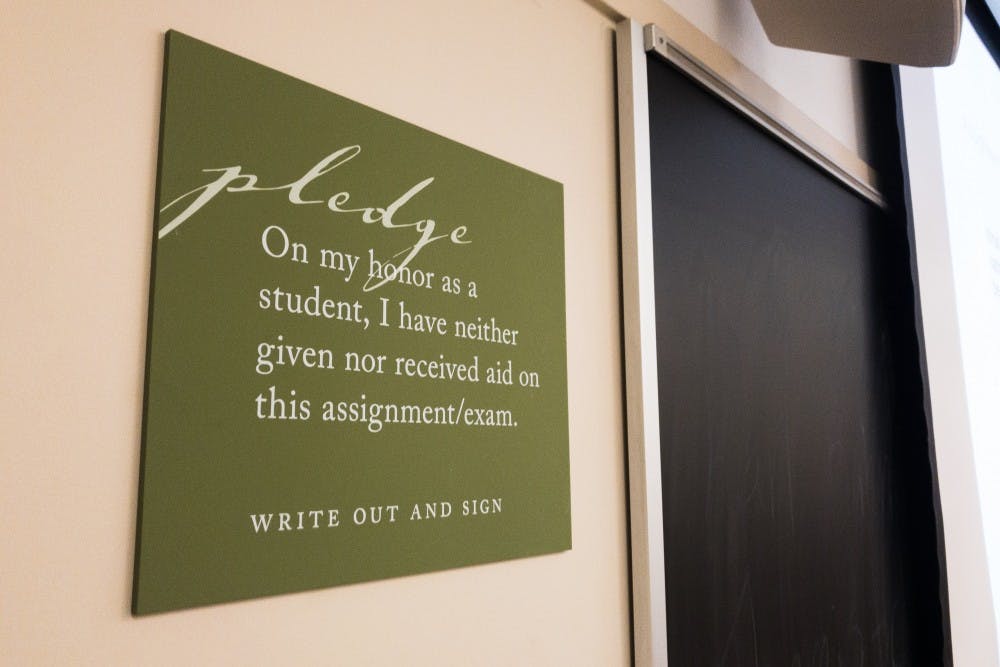The Honor Audit Commission released a report this week evaluating the current state of the honor system at the University and identifying areas where the system can improve. Through student and faculty survey data and comparisons to systems at peer institutions, the report identified an overlap of students who feel the Honor Committee represents student opinions but does not effectively represents the diversity of the student body. The survey work also found a majority of student and faculty respondents support an Honor penalty which varies depending on the severity of the offense.
The last audit of the honor system was conducted 17 years ago, in 2001. This year’s report is the culmination of 12 months of work from the collective efforts of the 16-member commission headed by Phoebe Willis, a Law and Darden student and former student member of the University Board of Visitors.
The Honor Audit Commission was created by the 2015-16 Honor Committee to review the honor system as a whole and help better connect students to the Honor Committee. The commission met for the first time in the summer of 2016 to lay out objectives and plans for its work, which concluded with its spring 2018 final report.
The report consists of three primary components — a section comparing student self-governance and the honor system at the University to 24 peer institutions with similar practices, data from a faculty survey and the results of a student survey. The report additionally highlights the process of selecting Honor support officers as well as the criteria, scope and process of a case making its way through the honor system.
The report will be presented to the University Board of Visitors Friday by Willis and Devin Rossin, a fourth-year College student and Honor Committee chair.
The report draws the attention of the Honor Committee to potential problem areas that may need to be addressed in order to continue cultivating an effective community of trust in future years, Willis said in an email to The Cavalier Daily.
“The purpose of our report was to highlight areas of risk where we believe Honor could focus their attention,” Willis said.
According to Willis, the Commission identified risk areas they believe require additional attention to maintain a functioning honor system including increased clarification and collaboration within the Community of Trust, improved student representation on the Honor Committee and increased faculty outreach.
The Commission identified three solutions to remedy the three concerns — reevaluating who defines the community of trust, reframing the discussion surrounding the community of trust and considering whether “significance” should remain one of the three criteria that determines an accused students guilt or innocence. An act is considered “significant” if toleration of it would harm the community of trust.
The Commission administered surveys to both students and faculty at the University in the spring of 2017, receiving responses from 286 students and 395 faculty members. The survey data is one of the largest components of the report, providing feedback to identify areas of concern with the system.
According to the survey, some students believe the Committee both effectively represents student opinions while not properly representing the student body. Out of 107 students who agreed with the statement, “the Honor Committee effectively represents the opinions of the student body,” only about 20 percent of the surveyed students also agreed with the statement “the Honor Committee represents the diversity of the University.”
Another layer of inconsistency seems to lie in student perception of the strength of Honor as a self-governing institution and the need for administration to be involved in proceedings. While 75 percent of surveyed students strongly agree or agree that the “Honor system is an excellent example of student self-governance at U.Va.,” 55 percent of surveyed students strongly agree or agree that “all decisions of the Honor Committee, actions of the Support Officers, and verdicts rendered at any Honor Hearings ultimately must be approved by the University Administration.”
According to the survey, the majority of faculty also agree that the Honor system is effective in facilitating and upholding a foundation of integrity at the University. However, some discrepancies exist among faculty opinions, specifically regarding the intent to report a violation and reports actually filed. In response to the statement “professors often refuse to report the matter to Honor and, instead, handle the matter themselves,” 75 percent of surveyed professors said they strongly agree or agree. Meanwhile, 64 percent of surveyed professors strongly agree or agree that “I would report a student if I suspected them of committing an honor offense.”
The single-sanction — the Honor policy whereby a student found guilty of an Honor offense of lying, cheating or stealing will be expelled from the University — was also a consistent point of concern in the Commission’s report.
Analysis of systems at peer institutions found that dual-sanction policies and multi-sanction policies at other universities generally increased the number of reported offenses. Dual-sanction systems are where there are two punitive measures for honor offenses, while multi-sanction policies have a range of punitive measures for offenses.
Survey data among both students and faculty seemed to support the presented idea that severity of the single-sanction is a high point of concern — 78 percent of surveyed students and 74 percent of surveyed faculty strongly agree or agree that “the length of the Leave of Absence should be commensurate with the severity of the offense.”
Willis said these discrepancies are areas where Honor may choose to do further exploration and likely occurred due to a “lack of understanding about Honor and how it works.”
Willis said the Honor Committee is not required to address the observations and recommendations the Commission made in its report. Rather, these are suggestions to inform the future work of the Committee.
“It is up to Honor to decide if and how they will address those areas,” Willis said.







